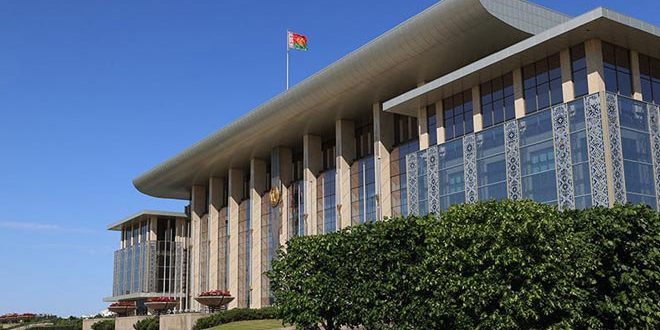The Belarusian presidency announced that President Alexander Lukashenko, after coordination with Russian President Vladimir Putin, made contact with the leader of the “Wagner” group, Yevgeny Prigozhin, where the latter agreed to stop the movements of his group’s militants in Russia and take further steps to calm the situation.
The presidency said in a statement today: “Putin briefed Lukashenko this morning on the situation in southern Russia regarding the private military company Wagner, and the two presidents agreed to work together and hold talks with the head of Wagner.”
The presidency added: “The negotiations with Prigozhin continued throughout the day, and as a result, agreements were reached regarding the inadmissibility of committing a bloody massacre on the territory of Russia, as Prigozhin accepted Lukashenko’s proposal to stop the movement of armed personnel affiliated with Wagner on the territory of Russia and take more steps to calm the situation.”
The presidency concluded its statement by saying: “At the present time, there is a completely acceptable and comfortable option for resolving the situation on the table, with security guarantees for the fighters of the private military company Wagner.”
For his part, Prigozhin announced, in an audio recording that he posted on his channel on the Telegram website, that the armed groups affiliated with him had stopped moving towards Moscow and departed in the opposite direction.
Prigozhin said, “In order to prevent bloodshed, our armed battalions have turned around and will leave in the opposite direction, that is, to the field camps according to plan.”
Armed groups affiliated with Wagner’s special military forces, headed by Prigozhin, seized the headquarters of the Southern Military District in Rostov and declared armed insurrection.
President Putin described Prigozhin’s actions as a criminal adventure and a stab in the back of Russia, while the Russian Federal Security Service opened a case against Prigozhin under the charge of organizing an armed mutiny.
In turn, Rostov Governor Vasily Golubev announced that all public institutions in the region are operating normally, including medical institutions, industrial companies, public transport, educational institutions and ambulance services.
The governor pointed out that there are sufficient stocks of food products and fuel in the city, and they are replenished regularly, calling on residents to be careful, not to leave their homes, and to stay away from military equipment and armed personnel.
NR

